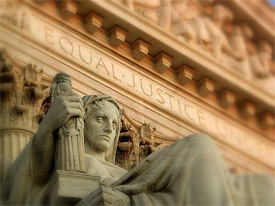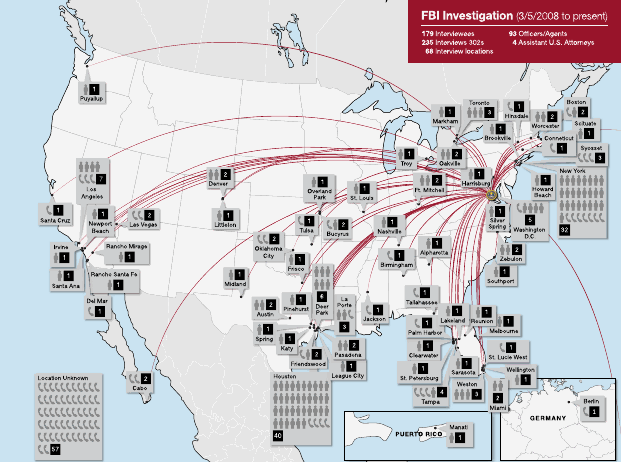Chief Justice Roberts, Flipped Votes, and the Naked Partisans
Yesterday Barack Obama discovered the one high-rankng Republican in the country who would help him raise taxes: John Roberts.
While the political (how will yesterday’s ruling affect both the Presidential and lower ticket races in November) and pragmatic (what red states will turn down tons of Federal money to provide health care for their poor) consequences of yesterday’s decision are still playing out, I’m quite interested in the Kremlinology over Roberts’ vote.
Because the unsigned dissent on the mandate refers to Justice Ginsburg’s opinion as itself the dissent–and for a slew more reasons–a number of people think that Roberts originally joined the conservatives, but then flipped at a late moment. (See here and here for a discussion of the evidence supporting that argument, see here for an alternative explanation.)
Then there are questions about why Roberts voted, for the first time, with just the liberal block, his first swing vote on one of the highest profile cases of his tenure. Was it to save the respectability of the Court? To gut the commerce clause? To serve his one consistent constituency, corporations?
The answer to those questions, too, are still playing out.
I can’t help but see this in another context. This decision was the last opportunity for SCOTUS to help defeat Barack Obama. They helped mightily with Citizens United and again with their rejection of the Montana campaign finance case. The Court came close to helping on voting rights and redistricting. The Republicans in the Roberts court has done a lot to make sure Obama doesn’t get to pick anymore of their future colleagues.
But yesterday’s decision had a big impact on the the course of this year’s election. Had the Administration lost, I do think they hypothetically could have used the loss as a rallying point, though in practice they have never shown the ability to win this political argument or even try in concerted fashion, so the more likely outcome would have been a setback at the polls. I do think given Mitt’s embrace of the dissent–rejecting insurance for those with pre-existing conditions, among other things–Democrats ought to be able to spin his opposition to great advantage. Yet I also agree with those who argue that neither Obama nor Mitt have an incentive to talk much about healthcare moving forward. Congressional races are another thing altogether, as the GOP will try to run on a promise to overturn ObamaCare.
Alll that said, I’m most struck by the naked partisan face that has emerged in recent days. While the dissent was largely an angry legalistic screed, the decision–to overturn all of ObamaCare–was radical in its intent. Ginsburg’s opinion’s frequent reliance on the Massachusetts example, RomneyCare, was a nice partisan touch. Most all there’s the haunting dissent to the SB 1070 ruling that Scalia read on Monday, using slavery-era law to argue that states could exclude undesirables from their state (to say nothing of Alito’s defense of life in prison for teenagers).
Roberts may be a corporatist, but the other four conservatives are showing far uglier faces of late.
Then there’s this detail. Amanda Terkel noted Jim DeMint saying conservatives had been “teased” into believing SCOTUS would overturn ObamaCare for them, doing as activist judges what even Erick Erickson now accepts must be done by politics.
“Teased”? What does that mean? Was DeMint “teased” with the results before Roberts flipped, if he did? Did DeMint have reason to believe the five conservatives had taken the radical step of overturning all of ObamaCare?
I don’t know the answer to that, but I will say that the dissenters yesterday have clerks and other staffers who, with a half hour’s work, could have hid the most obvious relics of John Roberts’ flip, if that’s what he did. Search and replace: “dissent,” “concurrence.” That is, if indeed Roberts flipped his vote, then it seems likely that the angry Republicans deliberately left evidence that would lead us all to speculate if not conclude he had done so.
SCOTUS doesn’t leak, Jack Goldsmith says, because it doesn’t bring the same political leverage that leaking does for Executive branch employees.
The justices benefit from the reality and mystique of secrecy, and gain nothing from a leak. A justice can frame a case to the public in a written opinion and wins no internal leverage (and likely loses some) from disclosing the disposition of a case prematurely.
[snip]
Emboldened lower level officials become disrespectful of the secrecy system and sometimes disclose classified information to spin an operation in their favor, to settle a bureaucratic score, or to appear important.
Whether or not Jim DeMint learned how the Court voted some time ago, if it’s true Roberts flipped his vote, then it seems likely the other conservatives–the ones serving an even uglier partisan ideology than Roberts’ raw corporatism–believe they benefit from making that known now, after the fact.
They delivered their side of the bargain, the clues in the dissent show. And they seem to want that known.





